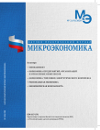Economic security and Technological sovereignty in modern industrial policy
DOI: 10.33917/mic-6.119.2024.94-103
The article examines the global trend of «reloading» national industrial strategies in the context of recent geopolitical and geoeconomic challenges. We describe the countries’ transition from priorities of economic efficiency to dominant priorities of economic security and their course towards achieving technological sovereignty (self-sufficiency) as its central component. We analyze this course in the leading world economies (EU, USA, China), as well as the risks for its successful implementation. Special attention is paid to a similar Russian course – the only alternative under the sanctions pressure. We find that in all types of economies, including Russia, achieving technological sovereignty may be a more difficult task than governments expect, and that the accumulation of inefficiencies from fragmentation of the global economy into blocs will eventually force countries to return to greater economic openness.
References:
1. Smorodinskaya N.V. Globalized economy: From hierarchies to a network order. Moscow: Institute of Economics RAS, 2015. 344 p.
2. Aiginger K., Ketels C. Industrial policy reloaded. Journal of Industry, Competition and Trade. 2024;24:7.
3. Evenett S., Jakubik A., Martín F., Ruta M. The return of industrial policy in data. The World Economy. 2024;47 (7):2762–2788.
4. Smorodinskaya N.V., Katukov D.D. Moving towards technological sovereignty: a new global trend and the Russian specifics. Baltic Region. 2024;16 (3):108–135.
5. Morgan T.C., Syropoulos C., Yotov Y.V. Economic sanctions: Evolution, consequences, and challenges. Journal of Economic Perspectives. 2023;37 (1):3–29.
6. Cha V.D. Collective resilience: Deterring China’s weaponization of economic interdependence. International Security. 2023;48 (1):91–124.
7. Tung R.L., Zander I., Fang T. The Tech Cold War, the multipolarization of the world economy, and IB research. International Business Review. 2023;32 (6):102195.
8. Aiyar S., Ilyina A., Chen J., Kangur A., Trevino J., Ebeke C., Gudmundsson T., Soderberg G., Schulze T.,
Kunaratskul T., Ruta M., Garcia-Saltos R., Rodriguez S. Geoeconomic fragmentation and the future of multilateralism. IMF Staff Discussion Notes, 2023. 42 p.
9. Stępka M. Identifying security logics in the EU policy discourse. Cham: Springer, 2022.
10.Drezner D.W. Global economic sanctions. Annual Review of Political Science. 2024;27 (1):9–24.
11. Afontsev S.A. Theoretical dimensions of economic sovereignty. Journal of the New Economic Association. 2024; (3):218–224.
12. Goodman M.P. Policymaking is all about trade-offs. Greenberg Center for Geoeconomic Studies. URL: https://www.cfr.org/article/policymaking-all-about-trade-offs
13. Edler J., Blind K., Kroll H., Schubert T. Technology sovereignty as an emerging frame for innovation policy: Defining rationales, ends and means. Research Policy. 2023;52 (6):104765.
14. Mazzucato M. Mission economy: A moonshot guide to changing capitalism. London: Allen Lane, 2021.
15. Dietrich A., Dorn F., Fuest C., Gros D., Presidente G., Mengel P.-L., Tirole J. Europe’s middle-technology trap. EconPol Forum. 2024;25 (4):32–39.
16. Reynolds E.B. U.S. industrial transformation and the «how» of 21st century industrial strategy. Journal of Industry, Competition and Trade. 2024;24:8.
17. Baldwin R.E., Freeman R., Theodorakopoulos A. Hidden exposure: Measuring US supply chain reliance. Brookings Papers on Economic Activity. 2023;(2):79–167.
18. Zenglein M.J., Gunter J. The party knows best: Aligning economic actors with China’s strategic goals. Berlin: MERICS, 2023.
19. Herrero A.G. What is behind China’s Dual Circulation Strategy. China Leadership Monitor. 2021;69.
20. Lenchuk E.B. Technological sovereignty — a new trend in Russian scientific and technological policy. Journal of the New Economic Association. 2024;(3):232–237.
21. Interdepartmental Working Group on Technological Development under the Government Commission on Economic Modernization and Innovative Development, VEB Research and Expertise Institute. The economy of scientific and technological breakthrough and sovereignty: scientific report. Moscow: RUDN, 2024.
22. Russia 2035: toward a new quality of national economy, Scientific report / Shirov A.A. (ed.). Moscow: Artique Print, 2024.
23. Transformation of the world economy: possibilities and risks for Russia, Scientific report / Shirov A.A. (ed.). Moscow: Dynamic Print, 2024.
24. Boer L., Rieth M. The macroeconomic consequences of import tariffs and trade policy uncertainty. IMF Working Papers, 2024. 42 p.
25. Baqaee D., Hinz J., Moll B., Schularick M., Teti F.A., Wanner J., Yang S. What if? The effects of a hard decoupling from China on the German economy. Kiel Policy Briefs. 2024;(170).
26. Smorodinskaya N.V., Katukov D.D. Iranian sanctions experience: macroeconomic outcomes and lessons for Russia. Bulletin of the IE RAS. 2023; (6):26–42.



